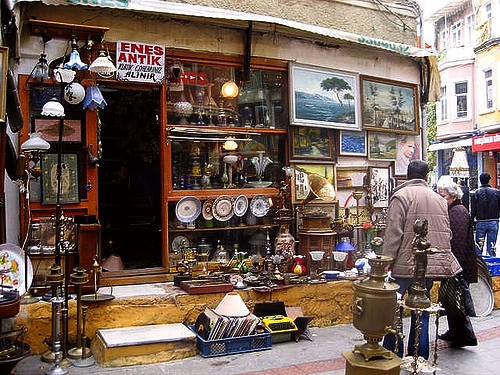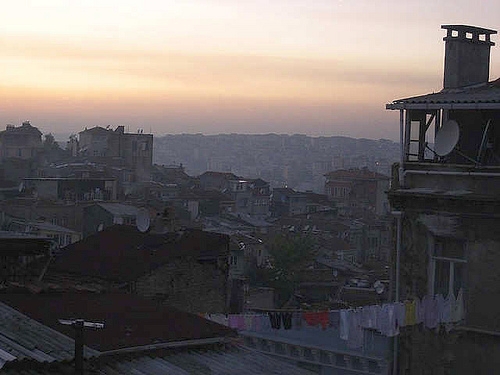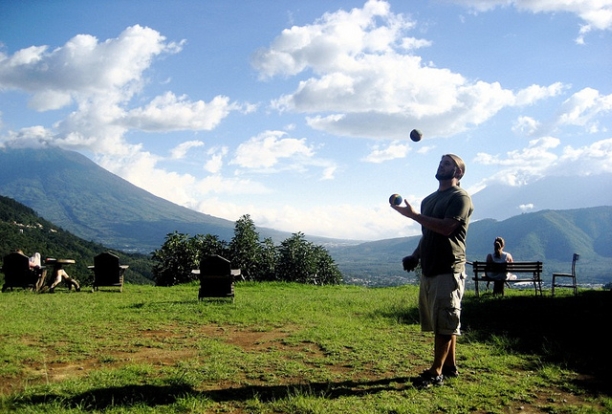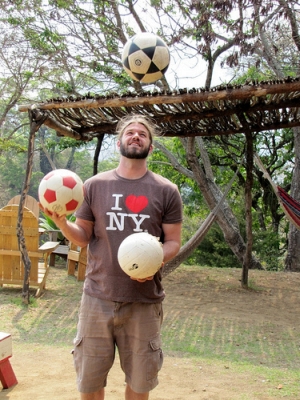The post Teaching English In Turkey: My Experience As An EFL Teacher appeared first on The Expeditioner Travel Site.
]]>
Why should you consider teaching English in Turkey? First off, Istanbul makes for a great place to begin an exploration into Middle Eastern culture. In many respects, it’s a European city, spider-work boroughs of narrow streets, public transportation around the city and wonderful arcades of well-maintained shops. In other ways — the turrets breaking up the skyline, hookah pipes and roasting hunks of meat in restaurant windows — you are most definitely not in Kansas anymore. Istanbul is one of those cities that seems to be on the cusp of everything: continents, religions, seas and cultures.
Due to its location, Istanbul has naturally adopted a comfortable mix. There are bars and cleavage, as well as the call to prayer echoing off the rooftops five times a day and women in hijabs. Market hawkers conjure up a multitude of languages to stop you for a go at the swashbuckling business of import/export negotiations. Even Istanbul’s trademark postcard filler, Aya Sophia, is a church turned mosque, which ultimately became a museum.
Istanbul is a stunning location in its own right, independent of all the converging outside influence. The city is composed of seven hills, bisected by the Bosphorus strait and bordered by sea, all creating some of the most dramatic cityscapes imaginable.
Sitting at a waterside café, staring over the straight at Topkapi Palace, the Blue Mosque, the Golden Horn, Galata Tower and beautiful bridges, it’s easy to understand why so many have stopped to pitch their tent here, and why Constantinople once was the center of the universe. As an English as a foreign language (EFL) teacher, it’s definitely one of those places that makes you ever-thankful to have been raised with a commodity everyone wants: Istanbul has millions of people who are eager to learn English.
Getting Work in Turkey
There are jobs to be found throughout Turkey, mostly in major cities like Adana, Izmir and the country capital Ankara. Undoubtedly, Istanbul, bigger than all three of these combined and with a much more international community, has the lion’s share of the EFL employment opportunities. Not only are private language schools in every neighborhood of the metropolis, but here lies the bulk of the universities, international primary and secondary schools, and a few great NGOs to check into.
In general, the best foot-in-the-door method for working in Istanbul is to go the language academy route, and there are plenty of options to choose from. The ubiquitous Berlitz language school — no surprise — has a location here, as well as home-grown EFL giant English Time, which is where I worked and has several branches throughout the city and country. There are many more employer options, including Wall Street Institute, The English Centre and Just English to name a few.
Still, like many places, the cushiest EFL jobs are university positions, which are plentiful, but more often than not, awarded only to people who are already present. The good news is that I’ve seen people just show up in Istanbul, look for a job and land a sweet university deal. Unlike working at the academies, universities tend to offer salaries rather than hourly pay, and vacation time comes a little more copiously. Good options to start with are Sehir University or Boğaziçi University.
Otherwise, a few more options remain in Turkey. Teaching children in Istanbul often pays a little more than the run-of-the-mill English classes for adults, and many of these options are in international schools like Small Hands. If money isn’t your main concern, Darüşşafaka Association is a fantastic NGO in Istanbul that works to give orphans opportunities. Furthermore, while the biggest, Istanbul isn’t the only city. Ankara and Adana get mixed reviews, but I’ve heard great things about the coastal cities of Izmir and Antalya.

My Working Life in Istanbul
To be completely honest, my personal experience working in Istanbul had its ups and downs. At times, in the spring and fall, the pay was very appealing but the hours, split shifts seven days a week, were too overwhelming. Then, in the summer, things slowed down quite a bit, allowing my wife and I to stay afloat but sometimes forced to dip into our savings from the springtime. During the month of Ramadan, the school more or less shut down. Unfortunately, the schedule and salary fluctuated more than I’d have liked, but English Time did always pay on time and in full.
As for students, English Time caters mostly to adults, often business people who attend three-hour classes in the evening after work. There were also quite a few university students, either supplementing their curriculum classes or trying to get a leg up on standardized tests like TOEFL or IELTS. Classes were equally mixed with women and men, the decorum fairly informal and most courses were beginner or lower level, though there were a few advanced groups. Turkish pupils, even adults, often become very attached to teachers and, in general, were friendly to me.
The aforementioned schedule was the most troublesome issue I had. In the spring and fall, I worked consecutive weeks without a day off (despite a contract that suggested otherwise), and most days were split shifts, meaning I taught from 10 a.m. to 2 p.m. during the day then from 7 p.m. to 10 p.m. at night. This is a fairly common practice with EFL jobs, but it is nonetheless disappointing when you find yourself overworked, overextended and ultimately unable to enjoy the place you’ve come to experience. Upon leaving, I vowed never to work an hourly job again.
Lastly, Turkey, while less visa-intense than many East Asian countries, does require foreign employees to have appropriate work papers. English Time had just gotten into serious trouble for having illegal workers, so they were quite diligent about getting us the correct documentation in due time and pretty good about arranging the paperwork and transportation. Expect your employer to handle this, including the cost of admission, and unless fluent in Turkish, I wouldn’t advise attempting it yourself. Don’t work illegally as you may be imprisoned.

Istanbul as Home
Now, for some positive thoughts. Istanbul is far and away my favorite city I’ve ever lived in, visited or read about. It bustles. It wakes up late and slow, and at 2 a.m. certain parts of town — Taksim Square and Istiklal Street — are packed, with plenty of cafes and bars still serving. The tourist section of Sultanahmet is stuffed with so many beautiful sights — the Blue Mosque, Aya Sophia, the Grand Bazaar — that exploring it is still fun months into living in Istanbul.
When I did have a chance to play, much of my time was spent walking the city, which is for the most part very safe and has loads of great alleyways and side streets to discover. I also enjoyed taking the ferry to the Princes’ Islands, maybe an hour trip into the Marmara Sea, great for a little relief from the 20 million-plus population. Moreover, the city is just packed with places to linger over cups of tea, have a few games of omnipresent backgammon and enjoy the view. There is always something to do, or not.
Getting around Istanbul is fairly easy as there is public transport going everywhere. Unfortunately, there are five different types — ferry, subway, bus, tram, and funicular — and trips often require using two or more, each calling for a new fare. That said, the price is really reasonable and all of the services quite clean and safe. Taxis, as well, are everywhere and sometimes a little overly interested in giving you a ride. Shuttles to and from the airport(s) leave frequently from Taksim Square and don’t cost much.
Of course, it’s also really cool living in the only major city that resides in two continents. I even got to participate in a marathon that crossed the Bosphorus Strait, allowing me to run from Asia to Europe. It’s also easy enough to get to other great attractions in Turkey, such as Cappadocia, an amazing desert of conical rock formations, and Ephesus with its ancient Greek ruins. Of course, in a country surrounded by three seas, there are also famous beach resort towns like Antalya and Bodrum that offer sand and surf.
Final Thoughts
Istanbul forever remains one of my options for the next place. I’d love to live there again one day, and I recommend it to every traveler I meet. It was a great gateway, as it is often referred to, for learning a little more about religion, for traveling into the Middle East, and for easing from Western culture into something not-so-shockingly different. The food, the tea, the tobacco flavors, the eclectic shops and tremendous views that seem to be hiding around every corner — the place instantly felt like home, or at least, somewhere you wouldn’t mind calling home.

About the Author
 Jonathon Engels, formerly a patron saint of misadventure, has been stumbling his way across cultural borders since 2005 and is currently back volunteering in the mountains outside of Antigua, Guatemala. For more of his work, visit his website and blog.
Jonathon Engels, formerly a patron saint of misadventure, has been stumbling his way across cultural borders since 2005 and is currently back volunteering in the mountains outside of Antigua, Guatemala. For more of his work, visit his website and blog.
The post Teaching English In Turkey: My Experience As An EFL Teacher appeared first on The Expeditioner Travel Site.
]]>The post Your Guide To Traveling Long Term On The Cheap appeared first on The Expeditioner Travel Site.
]]>
It seems every lush jungle, outcrop of volcanoes or tropical coastline has its own special version of the hostel life, an ex-pat community sucked into post-colonial lounging, Cuba Libras and Bob Marley tunes. If you are anything like me, you’ve always looked at the barefoot receptionist or the beach bum tending bar at eleven in the morning and wondered what the hell they’d figured out.
Too often, I found myself on two-week jaunts, a slave to itinerary, admiring the aimless wanderers and dreading my return to work, the adventuring having just begun. Then, I decided to be one of those boozy, schedule-be-damned prophets of hang and settled up a mountain in Guatemala for a year of pouring drinks and picking avocados. In other words: I became a full-time traveler.
I learned the great truth of flower-scented receptionists and rum-soaked bartenders: We were once fairly normal, real-world folk with IT jobs, office dress codes and rent to pay. We were chefs, scientists, students, teachers, marketers and every mundane occupation fading under the sun, but that two-week package was not long enough to satisfy our want for escape. So, we found a way: We learned to travel long on the cheap.
More Than a Dream: Making Adventure Reality
Once you’ve shucked the confines of a job, stuffed your parents’ attic with boxes and gone off gallivanting, it’s easy to shrug as if you’d never had a doubt in the world. Some travelers are filled with an unadulterated wanderlust, but in reality, many a tropical bartender started from a place of it-can’t-be-worse-than-this desperation. Regardless, it is possible to make this decision without throwing all caution to the wind. There are a bounty of routes and reasons to up and leave.
1) Saving up for it makes the choice reasonable, admirable even, and less impulsive. After all, loads of “sane” people save up for the hyper-consumption of summer vacation, spring break or weddings. By pocketing pennies for six months, you’ll convince everyone, including yourself, that you’ve got it all under control. All the working and scrimping is leading up to an enlightening, educational and ethereal experience, which hopefully it will be.
2) Getting out of the rat race doesn’t always satisfy the “responsible” naysayers. Many of us would’ve skipped high school were we given the choice, so why should work be any different? Now, you have the option to leave. Take a break from the drudgery and live what you’ve been working towards: a really long weekend.
3) My friend Scott works stateside as a chef mainly to migrate south every winter and avoid the cold. It began as a one-time excursion. Sick of the Minnesotan icebox, he headed south for relief. Now, he’s turned completely seasonal, earning his nest egg via summer tourism in Alaska then, when the temperature starts dropping, wintering in Guatemala. En route, he stops by Minnesota to see family and friends. Genius!
These are just a few suggestions for those who need to justify our decision to leave. I’ve learned that most good friends will encourage such insanity, while others might question your grip on reality, but the biggest challenge will be persuading yourself. It’s good to have a plan and some sound reasoning to take that first cab to the airport. Having a purpose can provide the necessary push out the door. I volunteered at a local elementary school. Who could object to that reasoning?

An Egg, a Nest, and an Omelet
Nothing says commitment and sensibility like hoarding away chunks of cash. Subsiding for three months, six months or an entire year or more requires a little padding in the bank account (USD$3,000 got me through a year). Even if you aren’t paying rent and are eating three free meals a day, there are costs: tickets, nights out, drinks, souvenirs, visas, etc . . . Here are some ideas to pad that nest egg and what to do once you’ve left home.
1) A funding program is wise. Most of us don’t have a few grand under the mattress. You could work by putting away a small portion of your salary every paycheck, and within a few months, you’ll be set. Or, a quicker option, though a bit too liberating for some, is selling your car, TV, stereo, couch, entertainment center — all the stuff that won’t be coming with you and will be problematic to store. Even the wiliest traveler needs it.
2) Next, you’ll need to find a nest, somewhere to spend all this free time. Central America is gorgeous, cheap and a classic backpacker haven, chock-a-block with hostels which, in exchange for a few hours of “working,” provide free room and board, breakfast, lunch and dinner. Generally, these arrangements, rather informal — meet-and-shake type affairs — are posted around tourist spots and might require two to three months of hanging.
3) You’ll have to break the egg and start traveling. Most places hire in person. Hostels need people who are already in the country, guaranteed to not bail out or turn out to be a knife-wielding lunatic. A will to mingle is a plus, as every couple of days, you’ll be acting host to a new fleet of temporary visitors, ready to soak it all in as quickly as possible. They’ll all want to know how you managed to make this place your home.
My hostel work experience was mostly in Guatemala, however, here are some places I’ve enjoyed and seen the work-stay agreement in effect: Weary Traveler Hostel (Mexico), La Iguana Perdida (Guatemala), Earth Lodge (Guatemala), Rocking J’s (Costa Rica), and Luna’s Castle (Panama).
Many guidebooks give tips, but you’ll learn more by getting somewhere and asking around. In the meantime, find a place to stay for a few bucks a night, and hopefully you’ve got that bank account to keep you afloat.

How to Be a Bum
A friend of mine spends half his year as a Christmas tree farmer, but the other is spent rallying fellow travelers for sangria parties before lunch, contentedly wasting hours balancing things on his chin. He captivates audiences with tales of heartbreak, airport body searches and working at a lakeside pupusa stand. Jeffrey has an inextinguishable ability to fill time, but many of us don’t, especially when we aren’t consumed with work. Therefore, here are some ways to fill that newfound free time.
1) Really consider what it is you’ll be doing with all of this new, idle time. Now would be the opportunity to pursue those bygone interests you’ve lived to regret never doing: the ukulele, a screenplay, surfing, a new language — whatever. Find something cheap to do that will make you feel the journey. After a month of free-flowing booze and irresponsible love-making — think of what you can do that is both worthwhile and character-building.
2) Volunteering opportunities are vast and varied in whatever country you find yourself, ranging from environmentally-friendly construction projects to farming to teaching English. Most hostels participate in community improvement projects, or at the very least, promote them, so getting involved is easy. Also, if the hostel scene gets too toxic, you can check out WWOOFing, which is volunteering on organic farms in exchange for room, board and food.
3) The key to maintaining your travel bum status is stretching those funds you’ve piled up, and the best way to do that is sticking to each place for a while, avoiding the cost of getting to the next destination. Staying put allows you to live locally, really get to know a place, fall in love with its quirks (or tamales) and perhaps even appreciate some of the comforts of “home” as you steer clear of the Americanized cafes and bars.
Having nothing to do is a problem most adults long for, but believe it or not, a month or two of hangover noon-rises and a three-novels-a-week habit can drag you down. This same constant lull creates fantastic jugglers, masters of fire poi, and the reason for the abundance of bracelet makers and bongo-toting writers-in-residence along the backpacker trail. You must learn to be a bum. So, get yourself a hobby or two — maybe a travel blog? — something to balance on your chin.
Parting Thoughts
Though it seems a life of wild risk-taking or untamed free-spiritedness, many people come to be beach bums, mountain dwellers and jungle inhabitants via calculated, conscious and conscientious means. It can be a responsible decision and, for some, much more relevant than saving up for the next car payment, house note or weekend resort blowout. Traveling long on the cheap is, without a doubt, one of the richest experiences I’ve ever had.
The most difficult thing about going is the going. Once you are abroad, life — as always — has a way of sorting itself out, regardless of your initial intentions, fears or struggles (stomach trouble happens, as do bug bites and sunburns).
Ex-pats and travelers are generally pleased to help newbies, provide a therapeutic beer, meal or cell phone in a pinch. We have tents and stories and advice; we have, at least on occasion, Jeffrey to offer up for entertainment.

About the Author
 Jonathon Engels, formerly a patron saint of misadventure, has been stumbling his way across cultural borders since 2005 and is currently back volunteering in the mountains outside of Antigua, Guatemala. For more of his work, visit his website and blog.
Jonathon Engels, formerly a patron saint of misadventure, has been stumbling his way across cultural borders since 2005 and is currently back volunteering in the mountains outside of Antigua, Guatemala. For more of his work, visit his website and blog.
The post Your Guide To Traveling Long Term On The Cheap appeared first on The Expeditioner Travel Site.
]]>